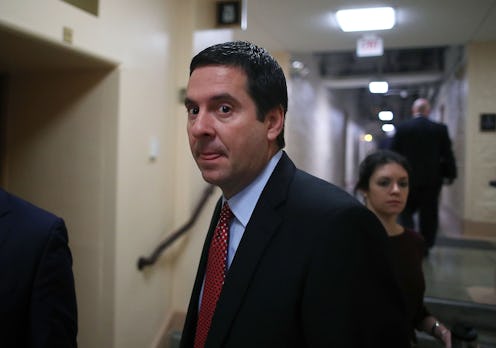News
This Lawmaker Wants To Put A *Physical* Wall Between Republicans & Democrats In Congress

CBS News reported Thursday that Republicans on the House Intelligence Committee will be building a wall between Republicans and Democrats in the committee's communal workspace. Several GOP lawmakers denied any knowledge of the plan when asked for comment by CBS, but one implied that the physical partition, which is expected to be erected by spring, was dreamed up by committee chair Rep. Devin Nunes (R-CA).
"I'm not part of that decision," Rep. Mike Conaway (R-TX) told CBS. "You've got to talk to Devin. I don't know what they're trying to do one way or the other."
The intelligence committee is in the midst of investigating Russian interference with the 2016 election. Like all Congressional committees, includes both Republicans and Democrats, and members have historically worked together on a bipartisan basis. However, relationships between Democrats and Republicans in the committee have broken down in recent months, a Republican committee member told CBS, as the Russia investigation has heated up.
"I swear to God I didn't know that," said Rep. Tom Rooney (R-FL), when asked about the plan to construct a barrier between Democrats and Republicans. However, he also said that "the level of trust and the level of everything down there is — it's poison. It's absolute poison down there." Rooney added that bipartisanship is "gone from that committee."
Rep. Adam Schiff (D-CA), the committee's ranking member, called the decision "terrible" and "destructive."
"We have heard reports that the chairman may seek to erect a 'wall' to divide the staff of the intelligence committee on a partisan basis — this would be a terrible mistake," Schiff told CBS News. "While we have more than our share of difficulties, the important oversight work of the committee continues with our staff working together irrespective of party. This would be a very destructive decision."
Relations between the Democratic and Republican members on the committee have slowly deteriorated since the Russia investigation began in December, and Nunes has been a particular source of contention for Democratic committee members. In March, Schiff accused him of acting as a "surrogate for the White House" instead of an impartial investigator, while Rep. Eric Swalwell (D-CA) said more recently that the "harm" Nunes has caused the committed "is irreparable," and called for him to be removed from his leadership position.
Nunes remains chair of the committee — but in April, he stepped down as head of the Russia probe after finding himself the subject of a House ethics investigation. The month before, the California Republican claimed to have received information suggesting that the intelligence community had monitored members of Donald Trump's presidential transition team — and in a highly controversial decision, he briefed the White House on this before presenting the information to his Democratic colleagues on the committee.
This led House Minority Leader Nancy Pelosi (D-CA) to call Nunes a "stooge for the president of the United States," and the House Ethics Committee soon opened an investigation into whether Nunes had improperly disclosed classified information to the White House. In December, the ethics committee ended the investigation — although The Atlantic later reported that ethics investigators weren't actually able to gain access to the information that Nunes shared.
Nunes was in the spotlight again in January when he released an internal memo that Republicans characterized as a bombshell document exposing anti-Trump bias within U.S. intelligence agencies. Democrats said that the memo didn't contain any information that hadn't been previously reported, and furthermore, accused Nunes and other Republicans of misrepresenting the information it did contain.It was then that Swalwell called for Nunes to step down from the committee entirely.
That was a low point in bipartisan relations on the committee — and given that the the two parties will soon have a physical barrier separating them from each other in common workspace, it doesn't look like things have improved since then.